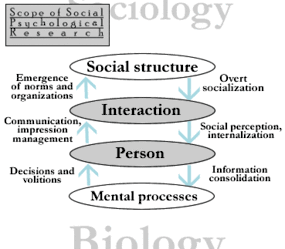Social psychology
Social psychology is the study in psychology of how people and groups interact. Researchers in this field are often either psychologists or sociologists. All social psychologists use both the individual and the group as their unit of analysis.[2]

The scope of social psychological research. Adapted from Cote and Levine (2002).[1]
Despite their similarity, psychological and sociological researchers tend to differ in their goals, approaches, methods, and terminology. They also favor separate academic journals and professional groups. The greatest period of collaboration between sociologists and psychologists was during the years immediately following World War II.[3] Although there has been increasing isolation and specialization in recent years, some degree of overlap and influence remains between the two disciplines.[4]
Related pages
References
Wikiversity has more on: Social psychology
The Simple English Wiktionary has a definition for:
social psychology.
- Cote, J. E. & Levine, C. G. (2002). Identity formation, agency, and culture. Mahwah, New Jersey: Lawrence Erlbaum Associates.
- Myers, David G. (1993). Social psychology. McGraw-Hill. ISBN 978-0-07-044292-4.
- Sewell, W. H. (1989). Some reflections on the golden age of interdisciplinary social psychology. Annual Review of Sociology, Vol. 15.
- Flick, Uwe (1998). The Psychology of the Social. Cambridge University Press. ISBN 978-0-521-58851-5.
This article is issued from Wikipedia. The text is licensed under Creative Commons - Attribution - Sharealike. Additional terms may apply for the media files.